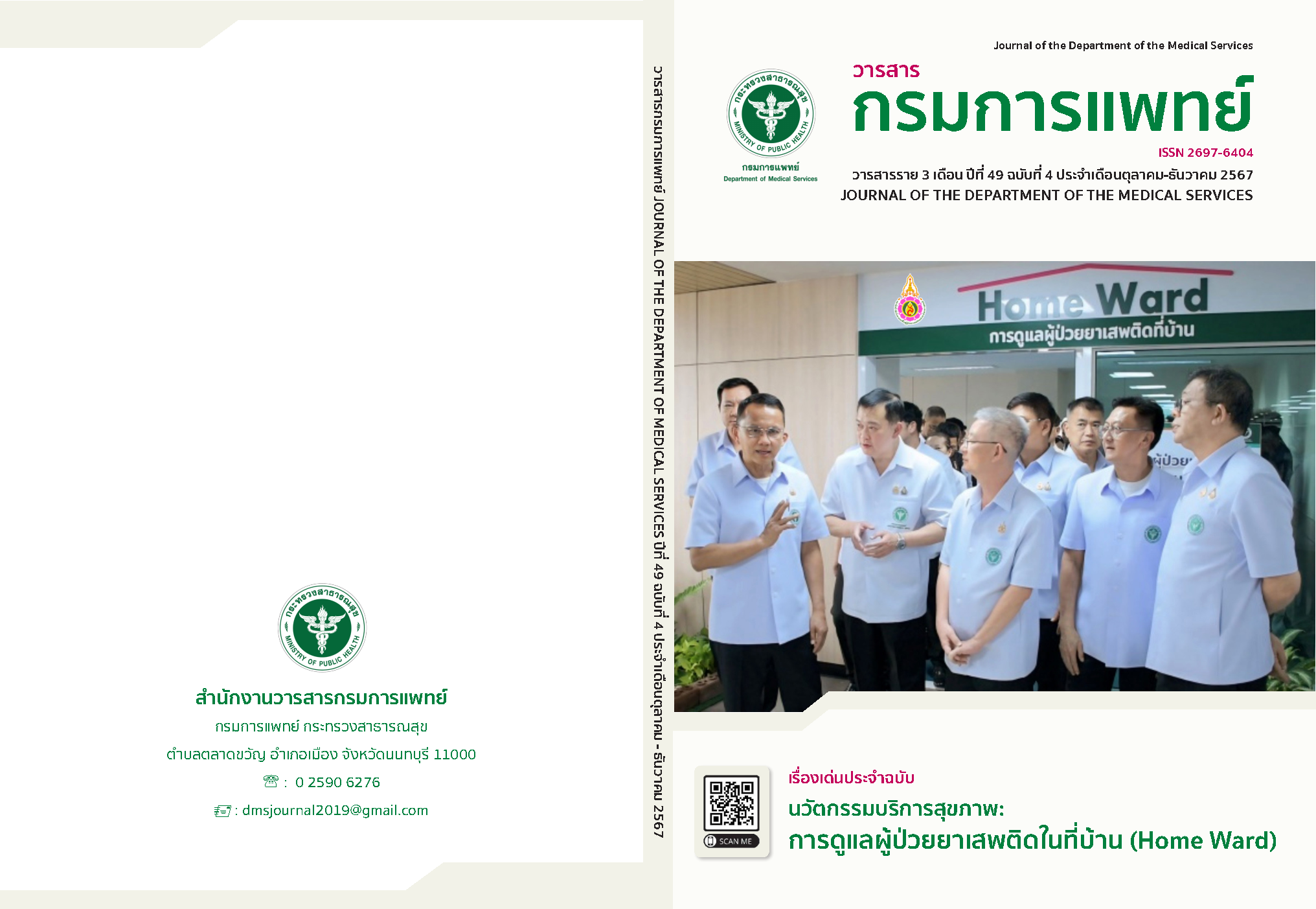Development of a Real-time PCR Assay of HLA-B*15:02 Allele for Prevention of Carbamazepine Induced Steven Johnson Syndrome/ Toxic Epidermal Necrolysis in Neurological Institute of Thailand
Keywords:
HLA-B*15:02, Real-time PCR, Steven-Johnson Syndrome (SJS), Toxic epidermal necrolysis (TEN), CarbamazepineAbstract
Background: Steven Johnson Syndrome (SJS) and Toxic epidermal necrolysis (TEN) are severe adverse drug reactions (ADR) that increase the morbidity and mortality. Most are hospitalized for a long period of time. This causes high treatment costs and possibly requires continuous treatment after being discharged from the hospital. Therefore, HLA-B*15:02 detection before drug dispensing can help physicians in selecting therapeutic drugs to prevent ADR or drug allergies in patients. Objectives: The researcher aimed at developing a real-time PCR assay for detection of HLA-B*15:02. Methods: EDTA whole blood samples were collected from 76 patients during 2022-2023, extract for DNA and screened for HLA-B*15:02 gene using the real-time PCR with in-house designed primers and probes specific for HLA-B*15:02 gene according to the HLA databases. Then, we compared the result of our developed real-time PCR assay with Sanger gene sequencing for HLA-B*15:02 gene genotyping. Results: In this study we found 29 positive HLA-B*15:02 (38.15%) and 47 negative HLA-B*15:02 were samples (61.85%) The sensitivity and specificity of this developing method were 100% and 100%, respectively. All samples were compared with Sanger sequencing and all results showed similar to sanger sequencing. Conclusion: This study was successful developed assay for detecting HLA-B*15:02 allele to prevent CBZ-induced SJS/TEN.
References
Tassaneeyakul W, Tiamkao S, Jantararoungtong T, Chen P, Lin SY, Chen WH, et al. Association between HLA-B*1502 and carbamazepine-induced severe cutaneous adverse drug reactions in a Thai population. Epilepsia 2010;51(5):926-30.
Harr T, French LE. Toxic epidermal necrolysis and Stevens-Johnson syndrome. Orphanet J Rare Dis 2010;5:39.
Locharernkul C, Shotelersuk V, Hirankarn N. Pharmacogenetic screening of carbamazepine-induced severe cutaneous allergic reactions. J Clin Neurosci 2011;18(10):1289-94.
Yang CY, Dao RL, Lee TJ, Lu CW, Yang CH, Hung SI, et al. Severe cutaneous adverse reactions to antiepileptic drugs in Asians. Neurology 2011;77(23):2025-33.
Locharernkul C, Loplumlert J, Limotai C, Korkij W, Desudchit T, Tongkobpetch S, et al. Carbamazepine and phenytoin induced Stevens-Johnson syndrome is associated with HLA-B*1502 allele in Thai population. Epilepsia 2008;49(12):2087-91.
Chen P, Lin JJ, Lu CS, Ong CT, Hsieh PF, Yang CC, et al. Carbamazepine-induced toxic effects and HLA-B*1502 screening in Taiwan. N Engl J Med 2011;364(12):1126-33.
Lim KS, Kwan P, Tan CT. Association of HLA-B*1502 allele and carbamazepine induced severe adverse cutaneous drug reaction among Asians, a review. Neurology Asia 2008;13:15-21.
Man CB, Kwan P, Baum L, Yu E, Lau KM, Cheng AS, et al. Association between HLAB*1502 allele and antiepileptic drug-induced cutaneous reactions in Han Chinese. Epilepsia 2007;48(5):1015-8.
Pavlos R, Mallal S, Phillips E. HLA and pharmacogenetics of drug hypersensitivity. Pharmacogenomics 2012;13(11):1285-306.
Wang Q, Zhou JQ, Zhou LM, Chen ZY, Fang ZY, Chen SD, et al. Association between HLA-B*1502 allele and carbamazepine-induced severe cutaneous adverse reactions in Han people of southern China mainland. Seizure 2011;20(6):446-8.
Virakul S, Kupatawintu P, Nakkuntod J, Kangwanshiratada O, Vilaivan T, Hirankarn N. A nested sequence-specific primer-polymerase chain reaction for the detection of HLA-B*15:02. Tissue Antigens 2012;79(4):295-301.
Sayer DC, Csssell HS, Christiansen FT. HLA-B*27 typing by sequence specific amplification without DNA extraction. Mol Pathol 1999;52(5):300-1.
Puangpetch A, Koomdee N, Chamnanphol M, Jantararoungtong T, Santon S, Prommas S, et al. HLA-B allele and haplotype diversity among Thai patients identified by PCR-SSOP: evidence for high risk of drug-induced hypersensitivity. Front Genet 2015;5(478):1-7.
Nguyen DV, Vidal C, Chu HC, Do NT, Tran TT, Le HT, et al. Validation of a novel real-time PCR assay for detection of HLA-B*15:02 allele for prevention of carbamazepine - Induced Stevens-Johnson syndrome/Toxic Epidermal Necrolysis in individuals of Asian ancestry. Hum Immunol 2016;77(12):1140-6.
Pegels N, Gonzalez I, Lopez-Calleja I, Fernandez S, Garcia T, Martin R. Evaluation of a TaqMan real-time PCR assay for detection of chicken, turkey, duck, and goose material in highly processed industrial feed samples. Poult Sci 2012;91(7):1709-19.
Prasertsang J, Vejbaesya S, Luangtrakool K, Chongkolwatana V. Development of in-house real-time polymerase chain reaction for HLA-B locus typing. J Hematol Transfus Med 2021;31:253-9.
Buchner A, Hu X, Aitchison KJ. Validation of single nucleotide variant assays for human leukocyte antigen haplotypes HLA-B*15:02 and HLA-A*31:01 across diverse ancestral backgrounds. Front Pharmacol 2021;12:713178.
Kulkantrakorn K, Tassaneeyakul W, Tiamkao S, Jantararoungtong T, Prabmechai N, Vannaprasaht S, et al. HLA-B*1502 strongly predicts carbamazepine-induced Stevens-Johnson syndrome and toxic epidermal necrolysis in Thai patients with neuropathic pain. Pain Pract 2012;12(3):202-8.
Downloads
Published
How to Cite
Issue
Section
License
Copyright (c) 2024 Department of Medical Services, Ministry of Public Health

This work is licensed under a Creative Commons Attribution-NonCommercial-NoDerivatives 4.0 International License.
บทความที่ได้รับการตีพิมพ์เป็นลิขสิทธิ์ของกรมการแพทย์ กระทรวงสาธารณสุข
ข้อความและข้อคิดเห็นต่างๆ เป็นของผู้เขียนบทความ ไม่ใช่ความเห็นของกองบรรณาธิการหรือของวารสารกรมการแพทย์



